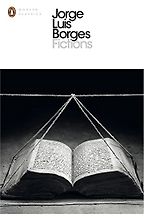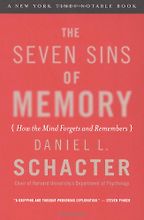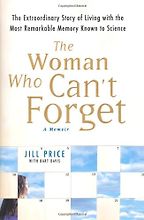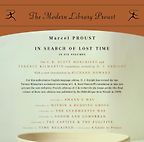Tell me about your first book, Fictions by Jorge Luis Borges.
Jorge Luis Borges is Argentinian and a masterful short story teller. All of his short stories have an intriguing question behind them. In his famous short story Funes the Memorius he writes about a young man who, after a riding accident, has forgotten how to forget. He remembers everything he has been exposed to in excruciating detail. He can’t walk any more and lies in his bed and has books brought to him. He reads them once and remembers everything. Borges describes how he visits this young man and realises that Funes has lost his ability to forget and thus to generalise and to extract. Borges writes that Funes only sees the trees but never the forest. He remembers all the details but can never rise above them.
How did Borges influence your book about memory in the digital age?
Borges asks what happens if we can’t forget? Will we, like Funes, be forever tied to an excruciatingly detailed past? Or will we be able to forget parts of it over time and therefore be able to evolve and move on? We might as a society have had that riding accident in a sense that we now have digital tools available to us that make it impossible to forget. Everything digital these days is being stored and kept accessible because of low storage costs, easy retrieval and a global network.
Let’s move on to your next book, The Seven Sins of Memory: How the Mind Forgets and Remembers by Daniel Schacter.
Daniel Schacter is a professor at Harvard University, studying how the mind remembers and forgets. The book is a beautiful story of the latest scientific evidence about how our memory works as we forget and remember. It is eminently readable and Schacter describes seven ‘weaknesses’ of our memory that make it very difficult for us to perfectly remember past events. In fact, Schacter argues that we don’t remember in the sense that we simply retrieve a document from digital storage. Instead, we continuously reconstruct our past. And as we do so we rewrite memories so that they conform to our present preferences.
Five Books interviews are expensive to produce. If you're enjoying this interview, please support us by donating a small amount.
At first, this might sound like a terrible weakness of the human mind but Schacter points out that it is actually a blessing; it makes it possible for humans to avoid cognitive dissonances between their past and their present. It helps us survive in an ever-changing world. But Schacter’s book offers many more insights beyond our brain’s avoidance of cognitive dissonances. There is a great example where he describes how many Americans, if specifically asked to give details about how they as a child were forgotten at the Mall, will ‘remember’ that event, even though very few of them were actually ever forgotten. At times, when primed by specific questioning, human memory may ‘reconstruct’ a past that never was.
Your next choice ties in with the theme of rewriting memory – this is David King’s The Commissar Vanishes.
This book is intriguing because it’s not focusing on something that happens in our mind. It is about what others do to our externalised memory. Photographs, books and letters are all part of that. But, as we realise that our own recollection isn’t that perfect and begin to rely on these, we may become quite dependent on the authenticity of these objects as pieces of (our) memory.
In this book David King looks at Soviet photoshopping. Whenever someone in official photos fell from grace he or she was manually retouched from the photographs. Dozens of people were airbrushed out of history.
Get the weekly Five Books newsletter
As we externalise our memories and put stuff up on Flickr, Facebook and YouTube, these companies will have the power to change our history. And it is easier than in Stalin’s times. Because, unfortunately, digital memories are much more malleable than analogue memories, and digital changes are harder to detect. In fact, a US colleague of mine told me that in the medical field peer reviewers of academic journals now struggle with digital photos that have been digitally altered.
Jill Price’s The Woman Who Can’t Forget has echoes of your first choice, but she is the real-life version.
Exactly. Borges made the story of Funes up but this is all about someone who really can’t forget anything in real life. She is woman who quite literally remembers almost everything that ever happened to her. She has been studied by scientists and by the popular press. Now she has written her autobiography with the help of a journalist.
The book is remarkable because of how vividly she is able to remember every single thing. Far from an eternal blessing, every of her past incorrect decisions continue to haunt her in the present and end up impeding her ability to decide what to do next. Again, there is this idea of total recall being problematic for us humans. She feels like she is shackled to the past and at times would love to have an erase button so she could forget it all – but she can’t. We see the same happening in our digital age. For example, many of us would love to get rid of those embarrassing memories of drunken parties and stupid photos but they are forever documented for all to see on Facebook!
Your last book is In Search of Lost Time by Marcel Proust.
This is Marcel Proust’s famous masterpiece which is an excruciatingly detailed chronicle of his life in which every single element and thought is captured and retold. Proust’s book is one of an entire (and well-known) genre: James Joyce’s Ulysses being one and Robert Musil’s A Man without Qualities a further one.
These authors aim to capture the entirety of our being and it creates a fascinating and excruciating rollercoaster experience for the reader. Our minds capture a myriad of impressions every minute, but we deal with that deluge of stimuli by forgetting most of them. If one undoes that, like Marcel Proust, one will experience a very acute sense of overload.
With the exception of The Woman Who Can’t forget and Daniel Schacter’s scientific analysis, my choices are works of literature. They envision a dystopian world in which we remember too much. Schacter points at cognitive reasons as to why perfect recall is problematic. The woman who cannot forget is suffering in real life what the other authors wrote about.
But she may not be alone for much longer. The digital tools around us make it very hard for us to forget and very easy for us to remember. So we might end up being the Funes of the future in an unforgetting, and thus unforgiving, world that is permanently tethering us to the past, inhibiting our ability to act in time.
Five Books aims to keep its book recommendations and interviews up to date. If you are the interviewee and would like to update your choice of books (or even just what you say about them) please email us at [email protected]










